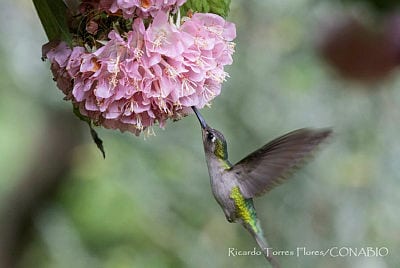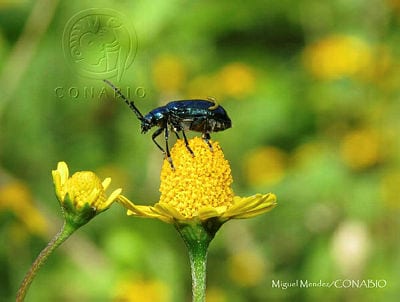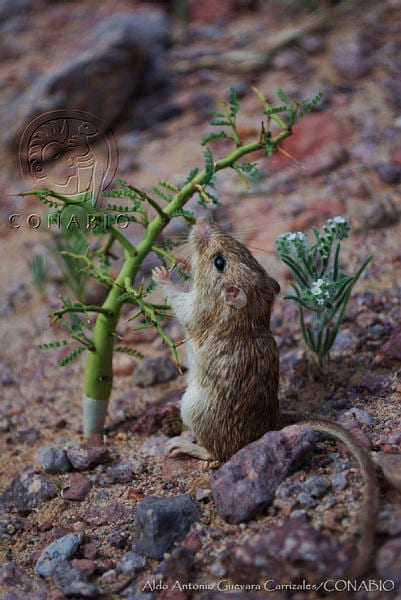Mexico

Why did Mexico decide to join the coalition?
Mexico is one of the 17 megadiverse countries on the planet, and is a center of origin and domestication of plants important to humans, with more than 420 species of plants cultivated for food, feed, fiber and other uses. Native pollinators of our country, including several species of solitary bees, bumble bees and stingless bees, have shown to provide pollination services in many crops such as chili, tomato, milpero tomato, beans, cucurbits (squash, chayotes, cucumber etc.), agaves and citrus fruits.
In Mexico, more than 85% of the cultivated plant species used depend on pollinators, and their value for the country is estimated at 43 billion pesos (over 2 billion USD).
Mexico recognizes that pollinators represent a key ecosystem service, crucial for biodiversity conservation and food security and that they are facing important threats that need to be urgently addressed.
Thus, many independent efforts have been conducted in Mexico, including scientific research, communication and dissemination, subnational bill initiatives and laws, and more recently cross-sectoral coordination to develop a national strategy for the conservation and sustainable use of pollinators.
Acknowledging that biodiversity conservation cannot be achieved by the development and implementation of environmental initiatives alone, and that cross-sectoral cooperation and aligned incentives are needed to succeed in ensuring the conservation, restoration, sustainable use and management of biodiversity, as the host of the UN Biodiversity Conference, Cancun, 2016, Mexico promoted biodiversity mainstreaming into productive sectors, particularly forestry, agriculture, fisheries and tourism during its COP Presidency.
Mexico joined the coalition in March 2018, recognizing the importance of the collaboration to protect pollinators, through information and experience exchange to support biodiversity mainstreaming into the agricultural sector and the development of a national strategy for the conservation and sustainable use of pollinators.

General information on pollinators, pollination and food production in Mexico
Mexico hosts 140 species of bats (11% of world’s total), 57 species of hummingbirds (16% of world’s total), 1,800 species of butterflies and moths (10% of world’s total), 35,500 species of beetles (10% of world’s total), and 6,313 species of bees, wasps and ants (3% of world’s total).
In Mexico, 21,841 species of angiosperms have been registered, of which approximately 80% depend to some degree on the pollination service provided by animals.
The different species of pollinators provide pollination services to 91 species of wild and cultivated plants. Some are species of cultivated native plants that are used as food, such as: squash, pitahaya, beans, avocado, cactus and vanilla pollinated by species of bees; tomato and chili pollinated by bumblebee species; agaves pollinated by bats; and cacao pollinated by dipteran species. Some of the plant species are directly harvested in their wild condition, for example, pitahaya, agave species and wild sweet potato.

Actions for the conservation and sustainable use of pollinators
Scientific Research
A large number of scientific papers have been produced by Mexican researchers in topics such as pollination biology, ecology and biogeography; relations between pollinators and cultivated and wild flora; tropical apiculture; contributions of native bees to crop pollination; birds and hummingbirds and their interactions with plants; tropical bees, honey bees, bumblebees and stingless bees ecology; bees ecotoxicology and parasitology; ecosystem services provided by bats – primarily agricultural pest control, seed dispersal and pollination; fragmentation effects on pollination; protection of butterfly hibernation shelters; butterflies migration and habitat conservation; bird watching and monitoring; the role of indigenous peoples and local communities in the conservation and sustainable use of pollinators, among others.
From the authors of these papers, Mexico nominated 11 experts for the IPBES Thematic Assessment on Pollinators, Pollination and Food Production, and 7 of them were selected to be part of the 77 authors of the assessment approved by the Plenary in 2016 in Kuala Lumpur, Malaysia.
In Mexico, at least four risk factors on pollinators have been identified and studied: 58% of the studies analyze the presence or effect of pathogens, 23% analyze the consequences of habitat loss (in part due to the intensive management of agriculture), 14% the effect of pesticides and 5% the effect of the presence of monocultures.
Society engagement: communication, dissemination and citizen science
Numerous communication and outreach materials have been released to engage the Mexican society in the protection of pollinators, such as articles, books, brochures, posters, identification guides, field guides, guides to build a garden for pollinators, videos, materials for children and teachers, citizen science initiatives.
Mexico’s National Commission for the Knowledge and Use of Biodiversity (CONABIO) has a media library where some of these materials may be found and downloaded, as well as a list of projects on pollinators currently being conducted in Mexico.
National and subnational legal framework
The existing standards in Mexico only establish specifications related to A. mellifera in the Official Mexican Standard NOM-002-ZOO-1994, and its update; NOM-002-SAG / GAN-2016, “Technical and operational activities applicable to the National Program for the Control of the African Bee”, which arose for the control of diseases in this species of bee and to control the dispersal of Africanized bees.
At the subnational level, the following initiatives and laws have been presented
1. “Law for apiculture promotion and protection of pollinating agents of the State of Jalisco” (Approved on October 2015 and amended on November 2019):
Objective:
- Establish the mechanisms for the effective production of honey and its derivatives and support the sector to improve its infrastructure and equipment.
- Establish the legal framework for the organization, protection, promotion, health, research, technological development, industrialization, breeding, exploitation, genetic improvement, and dissemination mechanisms to increase the consumption of honey.
- Conserve biodiversity and environmental services through pollination of natural and cultivated plants.
2. “Law of apicultural promotion and protection of the pollination process in the State of Queretaro” (Approved on May 2018)
Objective: Promote, regulate and protect:
- Organization, research, health, innocuousness, development, technification, mobilization, use and marketing of beekeeping.
- Protection of pollinators’ processes.
- Adaptation and mitigation of apiculture to climate change.
- Innovation and biotechnological development in apiculture.
- Environmental services inherent to apiculture.
- Consumption of products and byproducts from apiculture.
- Dissemination of benefits and challenges of apiculture, as a productive area and ecosystem services provided.
3. “Law for the protection of bees and the apicultural development of the State of Guanajuato” (Approved on November 2019):
Objective: promote actions from authorities and agricultural producers for the protection and well-being of bees, and the implementation of animal health measures that foster their conservation and care:
- Recognition of apiculture as an important economic activity.
- Recognition of bees as a vital species for ecological balance and human food security.
- Recognition of an important decrease of pollinators (mainly bees) due to intensive agriculture practices, land use change, pesticides, invasive alien species, diseases, pests and climate change.
4. Initiative: “Law for apiculture promotion and protection of pollinating agents of the State of Sinaloa” (Initially presented on October 2017, first read on November 2019):
Objective: Regulate apiculture in Sinaloa and facilitate actions for the conservation of biodiversity through the protection of pollinating agents, mainly bees:
- Regulate activities from the organization of beekeepers to the breeding and commercialization of products that can be obtained from honey bees.
- Coordinate efforts among authorities to avoid the loss of natural habitat resulting from land use for agriculture, mining or urban development.
- Integrate pollination in agriculture and natural ecosystems through the promotion of native pollination species, ecological planning and management at state and municipal level, and the restoration of degraded and deforested lands with plants that attract pollinating agents.
- Since in Sinaloa bees are mainly used for agricultural crops, the initiatives prohibit the expansion of 3 pesticides as they are considered dangerous for these insects: clothianidin, imiadaclopid and thiamethoxam.
5. “Law for the protection and promotion of apiculture of the State of Nuevo León” (Approved on December 2019):
Objective: Establish the legal framework for:
- The protection of beekeeping;
- The organization of producers;
- The promotion, improvement and encouragement of the marketing and industrialization of honey and other products from apiculture.

National Strategy for the Conservation and Sustainable Use of Pollinators
Background:
Mexico recognizes that it is necessary to understand the natural state of pollinator populations, in order to understand the effects of their decline in natural areas and in national agricultural and beekeeping production, as well as the effects on food security for Mexicans. However, the effect of pollinators on crops and the effect of pressure factors and their interactions on a potential decline of pollinators in Mexico have not been fully assessed.
Thus, Mexico has decided to adopt in the short term a national strategy for the conservation and sustainable management of both pollinators and the pollination process.
As a precedent for this strategy, Mexico’s National Biodiversity Strategy and its 2016-2030 Action Plan (ENBioMex), included actions to increase knowledge about pollination and the state of conservation of pollinators; to identify areas of importance and to maintain and restore the integrity of ecosystems, as well as to incorporate the value of this service into production chains.
Also, more recently, two verdicts of Commissions have been published in the Parliamentary Gazette in which points of agreement to carry out warrants are submitted to the consideration of the Assembly of the Chamber of Senators: one that involves the Secretariat of Agriculture and Rural Development (SADER), the Secretariat of Environment and Natural Resources (SEMARNAT) and the governments of the States, aimed at including in the national policy on animal health, measures for the preservation of bees in order to reduce risks in agricultural production and strengthen their productivity; another involving SADER, SEMARNAT, and the Federal Commission for the Protection against Sanitary Risks (COFEPRIS) to implement the inter-institutional and intersectoral actions necessary for an effective regulation of the use of highly dangerous agrochemicals, and to carry out training, research and constant innovation to deal with the Colony Collapse Disorder.
The development of the National Strategy for the Conservation and Sustainable Use of Pollinators (ENCUSP) had the active participation of various stakeholders from the government, Academia and civil society, including beekeepers as well as industries. The process included the guidelines and priorities established by the Coordination Group and its Expanded Working Group.
The Coordination Group is composed by SADER [particularly the Directorate General of Attention to Climate Change in Agriculture, and the National Service of Agrifood Health, Safety and Quality (SENASICA)]; SEMARNAT [particularly by the Directorate General of the Primary Sector and Renewable Natural Resources, and the National Commission for Natural Protected Areas (CONANP)]; and CONABIO.
The Expanded Working Group is composed by the Postgraduate College (COLPOS); the National Commission of Arid Zones (CONAZA); the National Institute of Forestry, Agricultural and Livestock Research (INIFAP); the National Seed Inspection and Certification Service (SNICS); the National Forestry Commission (CONAFOR); the National Institute of Ecology and Climate Change (INECC); the National Institute of Statistics, Geography and Informatics (INEGI); the National Council of Science and Technology (CONACyT); the National Autonomous University of Mexico (UNAM); and the Secretariat of Public Education (SEP).
Several workshops and revisions of the drafts of the ENCUSP were supported by the Federal Ministry of the Environment, Nature Protection and Nuclear Safety (BMU) of the Federal Republic of Germany within the framework of the project “Mainstreaming Biodiversity into the Mexican Agricultural Sector (IKI-IBA)” which is part of the International Climate Protection Initiative (IKI) and is implemented by the Deutsche Gesellschaft für Internationale Zusammenarbeit (German Cooperation for Sustainable Development, GIZ) GmbH.
General Objective of the Strategy:
Guide the policies and work of the productive and environmental sectors in relation to the conservation of the ecosystem services provided by pollinators, in order to contribute to Mexico’s sustainable development and food security.
Thematic Axes and strategic lines:
- Thematic Axis 1: Scientific and technological knowledge.
Strategic lines:
- Attention to information gaps for decision making
- Strengthening the generation of scientific and technological knowledge for the conservation of pollinators and their sustainable use
- Strengthening participatory monitoring at the local and regional level.
- Thematic Axis 2: Traditional knowledge and exchange of experiences and knowledge.
Strategic lines:
- Generation of spaces for knowledge exchange between the various knowledge systems and the different stakeholders.
- Promotion of the valuation of traditional knowledge and management for the sustainable use of natural resources.
- Thematic Axis 3: Social participation and education.
Strategic lines:
- Promote strategic programs to foster the conservation and use of pollinators
- Promote a cross-cutting environmental education strategy with cultural and territorial identity
- Thematic Axis 4: Legal standards and regulations.
Strategic lines:
- Review and strengthen the legal regulatory framework related to pollinators
- Promotion of community surveillance in coordination with competent authorities
- Thematic Axis 5: Planning and budget instruments.
Strategic lines:
- Promotion of cross-sectoral coordination for planning
- Strengthening public policies and budget programs related to pollinators
- Thematic Axis 6: Value of pollinators and their habitats.
Strategic lines:
- Promotion of the value of ecosystem and economic services derived from pollinators
- Thematic Axis 7: Landscape, connectivity and biocultural aspects.
Strategic lines:
- Promote an integrated landscape management approach, which includes aspects of connectivity and bioculturality for the conservation of pollinators
- Thematic Axis 8: Promotion of sustainable and biodiversity-friendly production.
Strategic lines:
- Promote and encourage conservation practices and sustainable use of biodiversity for the benefit of pollinator populations
- Avoid the massive and indiscriminate use of pesticides, herbicides and other highly toxic substances, as well as genetically modified organisms
- Promotion of sustainable value chains: fair trade, collective brands, local consumption certification brands, designation of origin.
Mexico’s expectations
The ENCUSP was finalized and approved on November 19, 2020 and it is in the process of being officially published in the Official Gazette of the Federation, and it will also be available on the official websites of the involved Secretariats.
Mexico is working actively and closely with various involved stakeholders, to implement the ENCUSP and its thematic axes while covering the following aspects:
- Implement consistent and comprehensive policies for the conservation and sustainable use of pollinators in sectoral and cross-sectoral programs and strategies;
- Reinforce and implement favorable management practices aimed at keeping healthy pollinator communities;
- Build and strengthen capacities of local stakeholders aimed at facilitating benefits of pollination for the productivity and livelihoods of targeted farmers, beekeepers, foresters, land managers and urban communities;
- Promote education and awareness in the public and private sectors on the value of pollinators and their habitats; and
- Assess the situation and trends, and fill gaps in knowledge about pollinators, their habitats and pollination as an ecosystem service, as well as the use of managed pollinators to ensure sustainability conditions.
Do you want to know more about Mexico’s efforts? Or do you want to get in touch?
For more information you may reach out to Hesiquio Benítez through e-mail: DCIB@CONABIO.GOB.MX.
